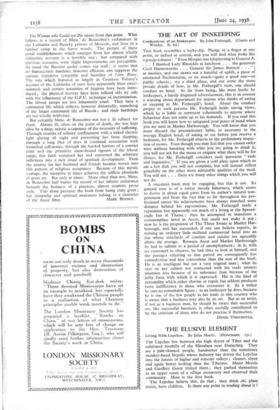THE ART OF INNKEEPING
This book resembles a lucky-dip. Plunge in a finger at one point, or indeed at several, and you will find what looks like a gossip-column : " Evan Morgan was telephoning to General A.
. . . I thanked Lady Rhondda at luncheon . . . the generous Cecil Harmsworths . . . General Sir James Burnett . . . " ; at another, and one draws out a handful of uplift, a piece of emotional Buchmanism, or an attack—quite a good one—on public schools ; try a third place, and out come the more prosaic details of how, in Mr. Fothergill's view, one should conduct an hotel. So far from being, like most books by innkeepers, a barely disguised advertisement, this is in essence a warning about deportment for anyone who thinks of eating or sleeping in Mr. Fothergill's hotel. About the conduct proper to such persons Mr. Fothergill holds strong views, which he is liable to represent vehemently to anyone whose behaviour does not come up to his demands. If you read this book you will know how to safeguard your peace of mind when you are next in Market Harborough. You will know that you must discard the precautionary habit, so necessary in the average English hotel, of asking to see before you reserve a bedroom, for Mr. Fothergill objects to the preliminary inspec- tion of rooms. Even though you may feel that you cannot order wine without knowing with what you are going to drink it, you will not ask for the menu or enquire what there will be for dinner, for Mr. Fothergill considers such questions " rude and inquisitive." If you are given a cold plate upon which to eat a hot dish you will not complain, but will instead reflect gratefully on the other more admirable qualities of the meal. You will not . . . there aTe many other things which you will not do.
A truculent book may be engaging; but this is not. Its general tone is of a rather moody bitterness, which seems to derive in about equal parts from its author's natural tem- perament and from the fact that so far throughout his pro- fessional career his achievements have always marched some distance behind his expectations. Mr. Fothergill made a reputation but apparently not much of a living at the Spread- eagle Inn at Thame ; then he attempted to transform a commonplace hotel at Ascot, but could not make it pay ; now he is the proprietor of The Three Swans at Market Har- borough, and has succeeded, if one can believe reports, in turning an ordinary little midland commercial hotel into an inn whose standards of comfort and cuisine are agreeably above the average. Between Ascot and Market Harborough he had to submit to a period of unemployment ; in it, with no customers to observe, he had time to look at himself, and the passages referring to that period are consequently less cantankerous and less contentious than the rest of the book. He is an intelligent but not a very original man ; what he says, on any subject not connected with his trade attracts attention less because of its substance than because of the jerky force with which it is expressed. His is the kind of personality which either charms or repels but seldom produces mere indifference in those who encounter it. As a writer he cuts no remarkable figure ; as an innkeeper he does, because he is one of the few people in his trade in this country who is aware that a business may also be an art. But as an artist, if not as a business man, he should be aware that successful art, like successful business, is often usefully contributed to by the criticism of those who do not practise it themselves.
DEREK VERSCHOYLE.














































 Previous page
Previous page